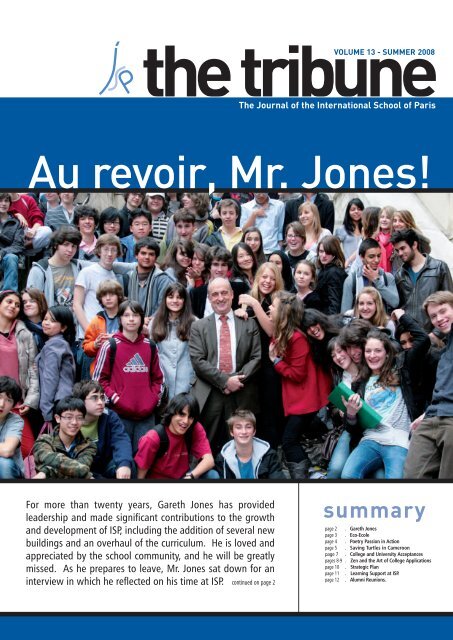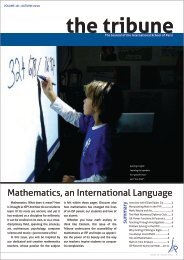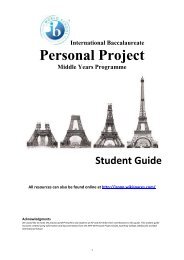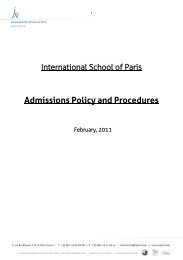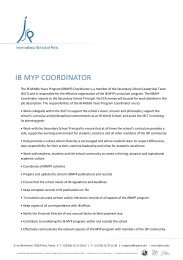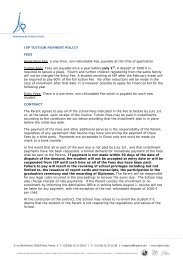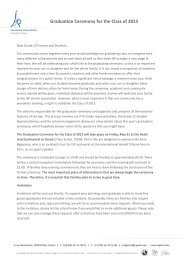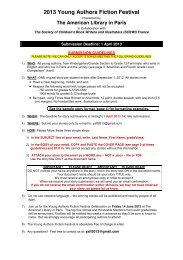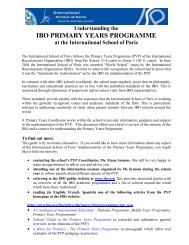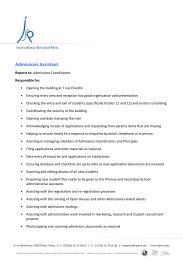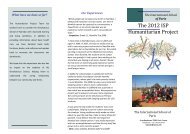The Tribune Vol. 13 - International School of Paris
The Tribune Vol. 13 - International School of Paris
The Tribune Vol. 13 - International School of Paris
- No tags were found...
Create successful ePaper yourself
Turn your PDF publications into a flip-book with our unique Google optimized e-Paper software.
thetribuneVOLUME <strong>13</strong> - SUMMER 2008<strong>The</strong> Journal <strong>of</strong> the <strong>International</strong> <strong>School</strong> <strong>of</strong> <strong>Paris</strong>Au revoir, Mr. Jones!For more than twenty years, Gareth Jones has providedleadership and made significant contributions to the growthand development <strong>of</strong> ISP, including the addition <strong>of</strong> several newbuildings and an overhaul <strong>of</strong> the curriculum. He is loved andappreciated by the school community, and he will be greatlymissed. As he prepares to leave, Mr. Jones sat down for aninterview in which he reflected on his time at ISP. continued on page 2summarypage 2 . Gareth Jonespage 3 . Eco-Ecolepage 4 . Poetry Passion in Actionpage 5 . Saving Turtles in Cameroonpage 7 . College and University Acceptancespages 8-9 . Zen and the Art <strong>of</strong> College Applicationspage 10 . Strategic Planpage 11 . Learning Support at ISP.page 12 . Alumni Reunions.
VOLUME <strong>13</strong> - SUMMER 2008Eco-ecoleISP continues its work to improve the environmentAs we went to press, the school heard that we have successfully been accepted as a full member <strong>of</strong>Eco <strong>School</strong>s <strong>International</strong>. Jacqueline Scott-Thomas, grade 11, updates us on the work so far.After a year <strong>of</strong> hard work, the ISP’s Eco-<strong>School</strong> hasestablished itself within the school community, buttheir work has only just begun. In the first year <strong>of</strong>the program, we have made great strides inreducing our waste and recycling throughout allthe buildings on both campuses <strong>of</strong> ISP. Weestablished a campaign to reduce waste, bought240 trees to be planted, implemented a newrecycling system, planted a tree and vegetablegarden on the Ranelagh Campus and made thepaper <strong>of</strong> the school eco-friendly and recyclable.<strong>The</strong> Primary and Secondary schools have workedclosely together, and will continue to do so as theproject continues. Over the next three years, Eco-<strong>School</strong> will continue to target the other areaswhere ISP can improve ecologically.Next year’s topic <strong>of</strong> focus will lie in energyresources. Sustainable living should be a part <strong>of</strong>all <strong>of</strong> our lives; it is <strong>of</strong> the utmost importance thatnow, more than ever, the ISP communityincorporates sustainable and green living into itsdaily routine. After all, recycling is only effective ifit is a part <strong>of</strong> how one lives every day, and not justwhen it is convenient. As consumers, it is criticalthat close attention be paid towards not only whatwe buy, but also how much we use; excess in anyform is a negative thing.From my experience with this project, I havelearned that creativity gets you a long way in thespirit <strong>of</strong> sustainable living. Fellow Eco-<strong>School</strong>members had similar positive experiences. "For me,the projects undertaken by Eco-<strong>School</strong> were aprivilege to be a part <strong>of</strong>," said Ingrid Lund, Grade11. Kifu Augousti, Grade 8, agreed, but also feelsthat "it is beyond important that we get involved inthese pressing environmental issues. Eco- <strong>School</strong>has not only taught me about my ownenvironmental impact, but it has also allowed meto spread green living amongst my peers".<strong>The</strong> Eco-Ecole Organization will evaluate what wehave achieved at the end <strong>of</strong> this school year toassess the progress that both the Eco-<strong>School</strong> andthe school community has made over the past yearin reducing waste. We will be judged on rigorouscriteria, but the Eco-Ecole label is a very respectedand honorable recognition to obtain, especially intoday’s world where environmental issues affecteach and every one <strong>of</strong> us.As Eco-<strong>School</strong> has discovered - it’s the little thingsthat make a big difference. So act now!REDUCE, RE-USE and RECYCLE!• Reduce paper consumption and re-use when you can• Think before you print (print double sided and on recyclable paper)• Reduce your amount <strong>of</strong> plastic bags• Reduce your amount <strong>of</strong> packaging (avoid individual packaging)• Shop smart (Buy fruits and vegetables that are in season)• Educate yourself and recycle properly where you live (Green, Yellow andWhite for <strong>Paris</strong>)• Invest in an eco-friendly lifestyle.• For more information on eco-school go to: http://www.eco-schools.org/PAGE 3
thetribunePoetry:Passion in action at ISPby Jacqueline Scott-Thomas, grade 11ISP resident poet,award-winning Harvard pr<strong>of</strong>essor,Jorie GrahamAs a young poet, I don’t always understand poetry, but I havedeveloped a passion as a reader and writer. I’ve learned thata perfect, immediate critical understanding is not necessarilythe only point. I’ve learned that poetry is all about being anadventuresome reader and risk-taking writer. Poetry is aboutthe sharing <strong>of</strong> poems.I was introduced to poetry by Molly Lou Freeman Dagorne,ISP teacher and editor <strong>of</strong> carnet de route. Molly Lou is thedriving force behind a yearly anthology <strong>of</strong> cutting-edge Frenchand English poetry and graphic design. She is an activeorganizer <strong>of</strong> literary events – readings and expos at public artcenters in <strong>Paris</strong> – building bridges with the <strong>Paris</strong> community.Molly Lou is my poetry teacher and she’s taught me to sharein the passion <strong>of</strong> the poem. Her mentorship, from readingBarbara Guest, John Keats, Ezra Pound, or WilliamShakespeare in grade 10 English, to her poetry workshopsand all those CAS hours getting involved with the project <strong>of</strong>carnet de route, has led me to pursue poetry. I’ve becomeimpassioned about the art. Molly Lou says that “poetry cantoo easily be misunderstood by youth, or just about anyone,as inaccessible, complex, strange stuff. Yet poetry is music,nonsense, games with language, all registers <strong>of</strong> the tongueswe speak, art, prayer, song, rebellion – the enduring creationand historical richness <strong>of</strong> language and text.” I agree thatwhile some <strong>of</strong> the greatest works may, at first, seem foreignto us, poetry is ultimately accessible to all, particularly if onetries to practice the craft.<strong>The</strong> project <strong>of</strong> carnet de route has <strong>of</strong>fered us a thriving visionfor poetry at ISP. Yearly, an American/ French poet teachesstudents and teachers – both at the secondary and primaryschools. Over its more than three years <strong>of</strong> existence, theproject <strong>of</strong> carnet de route has evolved into a much-respectedpublication, showcasing the work <strong>of</strong> established and risingstarpoets in French and English. It has benefited from thecollaboration with other artistic domains, photography andgraphic design, each art form enriching the other. As astudent, it’s clear to me why this project is so important to thegrowth <strong>of</strong> the <strong>International</strong> <strong>School</strong> <strong>of</strong> <strong>Paris</strong>. carnet de routehas not only been a link for the school to the arts community<strong>of</strong> <strong>Paris</strong>, but has generously encouraged a sophisticatedliterature culture to evolve within ISP.Still, what tends to be overlooked in the analysis <strong>of</strong> poetry isthe immense work in formulating a poem, in bringing poetryinto print, then in finding inspired ways to share it. What goesbeyond the words themselves is their presentation. <strong>The</strong> carnetde route collection is a singular example <strong>of</strong> such presentation.It has yielded praise and support from the AmericanAmbassador, Craig Stapleton, the French government (itsnational literary funding institution, le Centre National duLivre), and the Ile de France funds for literature. Thus, inaddition to enjoying generous support from families andteachers at ISP, the collection has successfully broughttogether a community <strong>of</strong> listeners and readers. I have beenfortunate to see the project grow from few words on a scrap<strong>of</strong> paper, to the thoughtful pages <strong>of</strong> a bound collection. In ourpoetry workshops, we talk and learn about how a poem istransformed from the poet’s page to a graphic composition, toa printer’s galley, to a gallery exposition and reading.Poetry can form and mould minds, like my own, <strong>of</strong>fering newand rich experiences and perspectives. Poetry can make usmore intelligent, thoughtful, creative and questioning people.For poetry is a generous gift from the poet, leaving itsaudience, its readers impassioned.Carnet de route’s website:www.isparis.edu/page.php?id=153PAGE 4- T H E J O U R N A L O F T H E I N T E R N A T I O N A L S C H O O L O F P A R I S - w w w . i s p a r i s . e d u
VOLUME <strong>13</strong> - SUMMER 2008SavingTurtlesin Cameroon:By Michael Smulders, Head <strong>of</strong> ScienceFour Teachers Making a DifferenceLast Christmas, four staff members,Marie-Cyrille Lavallé, Vicky Longhurst,Colin Mulholland and MichaelSmulders, participated in a volunteerproject for the conservation <strong>of</strong> sea turtlesin Ebodje, Cameroon, run by theNGO, Planet Urgence.<strong>The</strong> Olive Ridley (Lepidochelys olivacea),the Green turtle (Chelonia mydas) andthe Leatherback (Dermochelys coriacea)turtle are species <strong>of</strong> sea turtles that neston the beaches <strong>of</strong> Cameroon.<strong>The</strong> initial goals <strong>of</strong> this project were:• To identify and quantify the turtles nesting onthe beaches <strong>of</strong> Ebodje.• To transplant eggs to a hatchery, so that theeggs are safe from poachers, dogs and crabs.• To put badges on turtles.• To clean up the beaches.• To promote conservation <strong>of</strong> turtles amongstthe villagers.• Adopt turtles that are caught in the nets <strong>of</strong>fisherman.<strong>The</strong> start <strong>of</strong> the trip was somewhat chaotic.After meeting up with two other volunteers,spending an unexpected night in a hotel, a lot <strong>of</strong>hustling with a cab driver, and two cars breakingdown in the middle <strong>of</strong> nowhere, we arrived atour final destination: Ebodje. Ebodje is afishing village <strong>of</strong> 800 inhabitants in a nationalpark in southern Cameroon. <strong>The</strong>re is noelectricity and no running water. <strong>The</strong> project wasrun from the turtle museum in the village. WithDenis and Toby, the technicians <strong>of</strong> the project,we patrolled the beaches <strong>of</strong> Ebodje for 8 nightsand observed 4 Olive Ridley turtles and 4 turtlenests. Unfortunately, two <strong>of</strong> these nests weredestroyed.Swedish EmbassyHosts Fund Raiserfor Namibia 2008by Ingrid Lund, Grade11, on behalf <strong>of</strong> the Namibia Team<strong>The</strong> second annual 2008 Namibia trip is well on its way in terms <strong>of</strong>planning. After many fruitful meetings, the team has commenced thegreat task <strong>of</strong> fundraising, not only for our tickets, but also for specificequipment and supplies we will need during our community serviceinfusedsummer. A milestone in this work has been our recent talentshow hosted at the Swedish Embassy. On the evening <strong>of</strong> April 5th,nine excited performers presented their various talents to a wonderfulcrowd <strong>of</strong> ISP parents, teachers and students. We were also honoredby the presence <strong>of</strong> the Namibian Ambassador to France who has<strong>of</strong>fered her help and support, and we raised €1100! <strong>The</strong> whole ISPcommunity was represented, to the performers’ delight. We wouldlike to thank the Swedish Ambassador for all his help, without whichour talent show would not have been possible, as well as the chef atthe Embassy for her tasty donations. And finally, we would like tothank you all for your continued support and encouragement in ourproject.PAGE 5
the tribune<strong>The</strong> turtles...This was not the only disappointment <strong>of</strong> theproject. <strong>The</strong> cleaning <strong>of</strong> the beaches did nottake place and there was no garbagecollection in the village. Only a trickle <strong>of</strong> themoney paid to Planet Urgence arrived at theactual project. <strong>The</strong> technicians were badlyequipped and underpaid and the hatcherywas in ruins. Most <strong>of</strong> the money was lost inthe hierarchy <strong>of</strong> the national park. <strong>The</strong>technicians also lacked funds to adopt turtlesfrom the fishermen. <strong>The</strong> fishermen neededcompensation because the turtles destroyedtheir nets and the technicians feared theycould not continue their work much longer.Frustrated with the state <strong>of</strong> the project, wedecided to pay for and help repair thehatchery. By placing turtles in a hatchery,their eggs will be protected from predationby crabs and dogs, and from poaching byhumans. A hatchery will also allow thetechnician to assist the hatched turtles toreach the ocean. Part <strong>of</strong> the repair has beenfinanced with money raised by ISP students.Completing negotiations with the village chief!We broke down the old hatchery and Tonywent to the nearest town to collect thenecessary material to rebuild it. However therepair turned out to be more complicatedthan foreseen. A neighboring family claimedto own the land on which the hatchery stoodand a park game warden was upset becausewe had not respected the proper hierarchybefore we went into action. <strong>The</strong> local politicsdelayed the reconstruction for several daysbut after the village chief intervened the workcould continue, although the work was onlycompleted after we left.Fortunately, one <strong>of</strong> the other volunteers is avery qualified human resources manager andhe made a very thorough analysis <strong>of</strong> theorganizational structure <strong>of</strong> the project. Withhis help we were able to write a very criticalreport to Planet Urgence and Marie-CyrilleLavallé contacted the coordinator <strong>of</strong> theproject regularly after we came back. Thisincited her to visit the project and she hasensured us that the money volunteers pay toPlanet Urgence now goes directly to theproject. This has enabled the technicians tocontinue their work and to adopt turtles fromthe local fishermen. Although we could notcontribute as much as we wanted to theconservation <strong>of</strong> turtles, our visit has had apositive effect in the long run because <strong>of</strong> ourcritical feedback. <strong>The</strong> improvements to theproject have made our visit to Cameroonextremely valuable. <strong>The</strong> money PlanetUrgence volunteers pay towards this projectnow actually goes directly to the turtleconservation effort.I would like to sincerely thank ISP for havingmade this unique experience possible.Students have raised money for theconservation <strong>of</strong> turtles. With this moneyseveral turtles have been adopted, moneyhas gone towards the hatchery and now,even the Ebodje <strong>School</strong> has been givenfootballs!Congratulations!ISP made a strong showing in the recent Red Wheelbarrow CreativeWriting Competition, with Brianna Botchwey (grade 11) and CharlotteMcGill (grade 7) both winning first place in their respective categories.Jamie Fraser (grade 9) came second in his category, while Georgia Orr(grade 2) and Natalie Salomon (grade 6) achieved Honorable Mentions intheirs. Congratulations to them all!Emma DornanSecondary <strong>School</strong> LibrarianWord PlayIn French and Spanish,Mylène Foucher's students learn oneidiomatic expression each week.How many <strong>of</strong> the following ones doyou know ?Il fait un froid de canard.Appuyer sur le champignon.Vouloir le beurre et l'argent du beurre.Avoir les yeux plus gros que le ventre.Avoir une faim de loup.Tomber dans les pommes.PAGE 6- T H E J O U R N A L O F T H E I N T E R N A T I O N A L S C H O O L O F P A R I S - w w w . i s p a r i s . e d u
VOLUME <strong>13</strong> - SUMMER 2008College and UniversityAcceptancesCongratulationsto the Class <strong>of</strong>2008!Canadian UniversitiesArt Institute <strong>of</strong> VancouverUniversity <strong>of</strong> British ColumbiaConcordia UniversityMcGill UniversityQueens UniversityRyerson UniversityUniversity <strong>of</strong> TorontoUniversity <strong>of</strong> WaterlooYork UniversityUK UniversitiesBournmouth UniversityUniversity <strong>of</strong> BrightonBrunel UniversityCity University<strong>The</strong> University <strong>of</strong> DurhamUniversity <strong>of</strong> East Anglia<strong>The</strong> University <strong>of</strong> Edinburgh<strong>The</strong> University <strong>of</strong> EssexUniversity <strong>of</strong> Exeter, Peninsula Medical<strong>School</strong>Goldsmiths College(University <strong>of</strong> London)Imperial College London(University <strong>of</strong> London)Keele UniversityKing's College London(University <strong>of</strong> London)Kingston UniversityLeeds Metropolitan UniversityLondon Metropolitan UniversityLondon <strong>School</strong> <strong>of</strong> Economics andPolitical Science (University <strong>of</strong> London)<strong>The</strong> University <strong>of</strong> ManchesterNewcastle College<strong>The</strong> University <strong>of</strong> NottinghamQueen Margaret University College,EdinburghQueen Mary, University <strong>of</strong> LondonRegents Business <strong>School</strong> LondonRichmond, <strong>The</strong> American <strong>International</strong>University in London<strong>School</strong> <strong>of</strong> Oriental and African Studies(University <strong>of</strong> London)University <strong>of</strong> the Arts, London -Foundation YearUniversity <strong>of</strong> BathUniversity <strong>of</strong> SouthamptonThames Valley UniversityUniversity College London(University <strong>of</strong> London)Roehampton UniversityUniversity <strong>of</strong> SurreyUniversity <strong>of</strong> Wales Institute, Cardiff<strong>The</strong> University <strong>of</strong> WarwickOther EuropeanUniversitiesAmerican University <strong>of</strong> <strong>Paris</strong>Ecole Hotelière de LausanneU.S. Colleges andUniversitiesAmerican UniversityBennington CollegeBowdoin CollegeBryn Mawr CollegeChapman UniversityColumbia CollegeElon UniversityEmory UniversityEndicott CollegeGeorge Washington UniversityGrinnell CollegeHampshire CollegeJohn Hopkins UniversityKenyon CollegeLoyola University, ChicagoLoyola Marymount, Los AngelesLynn UniversityMacalester CollegeManhattanville CollegeMount St Mary's UniversityNortheastern UniversityOhio UniversityOberlin CollegeParsons <strong>School</strong> <strong>of</strong> Design, New YorkParson <strong>School</strong> <strong>of</strong> Design, <strong>Paris</strong>(Foundation Year)Pennsylvania State UniversityReed CollegeSuffolk UniversityUniversity <strong>of</strong> Colorado at BoulderUniversity <strong>of</strong> RedlandsUniversity <strong>of</strong> San DiegoUniversity <strong>of</strong> San FranciscoVassar CollegeWake Forest UniversityWheaton CollegeNote: Korean and Japanese academicyears begin in March/April. Acceptanceswill be published in the next edition.PAGE 7
the tribuneZen and the Art <strong>of</strong><strong>The</strong> college admissions process is an exciting and revealing experiencewhich gives students a chance to look at who they are, what they value,and what they might want to do with their lives. It is the time whenstudents can develop greater self-awareness and confidence as theyadvance through this process and prepare for the transition to the nextexciting phase in their lives. At the same time, it can also be acomplicated, demanding, and time consuming process which can causestress and anxiety, if not approached in a measured and calm manner.As described by the psychologist Michael Thompson in an essay titled"College Admission as a Failed Rite <strong>of</strong> Passage", college admissions "canmake normal people act nutty, and nutty people act quite crazy." Ascollege admissions will continue to becompetitive over the next several yearswith the increased number <strong>of</strong> studentsapplying in the U.K., Canada, and theU.S., it is important to understand therole <strong>of</strong> the student, parent, andcounselor and to develop an approachand awareness to make the universityapplication process enlightening andrewarding.Parents are <strong>of</strong>ten concerned with whenand how college preparation begins atschool and if they are already behind inthe process. Enrolling students at ISP,even as soon as the Early Years Program, is already a beginning in theprocess. Our students, as IB learners, are already striving to beinquirers, knowledgeable, thinkers, communicators, principled, openminded,caring, risk-takers, balanced, and reflective – all characteristicsthat selective universities seek in students. <strong>The</strong> IB curriculum is a preuniversityprogram that has already put students on a path for collegepreparation. Even in the PYP and MYP, intellectual inquiry and criticalthinking are encouraged and students are supported in pursuingextracurricular activities as well as volunteering for community service.Universities world-wide recognize the rigors and value <strong>of</strong> the IBprogram as evidenced by the higher rate <strong>of</strong> acceptance for IB diplomastudents in comparison to other academic programs.“Our students, as IB learners,are already striving to beinquirers, knowledgeable,thinkers, communicators,principled, open-minded,caring, risk-takers, balanced,and reflective – allcharacteristics that selectiveuniversities seek in students.”<strong>The</strong> Student as the Center <strong>of</strong> the Application UniverseStudents need to realize that it is important for the future that they arein control <strong>of</strong> the application process which will lead them to a gooddecision about life after ISP. How do you take control <strong>of</strong> the process andwhen does it start? You have already begun building the structure <strong>of</strong>your education by selecting courses in your IB curriculum whichchallenge and interest you; in addition, you have continued activities inwhich you have an interest or passion, such as music, art, film, andsports. <strong>The</strong> college process formally begins in Grade 11 as you start toevaluate and assess yourself, understand what you are looking for in acollege, research schools, organize your application information, attendcollege visits at ISP, and go to visitcolleges. Throughout the collegeselection process the emphasis is on thestudent - you, an individual looking for aspecial college or university that fits you.After all, it is you who will be attendingschool and the most important factor incollege success is that the student feels itis a right choice once there and becomesactively engaged in her/his universityeducation. <strong>The</strong>refore, the student is thefocus and should be in charge – not yourparents, not the counselor; you have thefinal word on what is best for you. Withthis important decision comesindependence, self-fulfillment and great responsibility – theresponsibility <strong>of</strong> being well organized, keeping records <strong>of</strong> your collegesearch, knowing and meeting deadlines for any required tests, as wellas college deadlines, and the responsibility <strong>of</strong> requesting teacherrecommendations (if required), meeting with the college counselor,filling out applications, and writing a personal statement. Althoughthis responsibility may seem overwhelming, you should remember thatthe college selection process also involves a team – a team <strong>of</strong> teachers,the counselor, and your family who are there to support and guide you.Selecting a university can be an enriching process for you as well asbeing an important step towards maturity and personal development.PAGE 8- T H E J O U R N A L O F T H E I N T E R N A T I O N A L S C H O O L O F P A R I S - w w w . i s p a r i s . e d u
VOLUME <strong>13</strong> -SUMMER 2008College ApplicationsBy Diane Hopkinson, College Counselor<strong>The</strong> Role <strong>of</strong> Parents/FamilyFamilies are instrumental in helping studentsseize control <strong>of</strong> their lives and take theinitiative in developing skills that areimportant for their future. So how and whendo parents start preparing their children forhigher education? As Bill Mayher states in<strong>The</strong> College Admissions Mystique, parentsplay an important role in nurturing theirchildren to internalize "concepts such asmindfulness, integrity, respect, curiosity, selfdirection,flexibility, and resilience which areimportant for a lifetime and not justimmediate college admissions." He furtherlists "A Parent's Starter Kit: A Dozen ThingsParents can do Early, Very Early" several <strong>of</strong>which include 1. Read to your children, 2.Turn the TV <strong>of</strong>f, 3. <strong>Vol</strong>unteer togethersomewhere, such as a homeless shelter, 4.Resist shopping as a vocational/ recreationalactivity, 5. Find ways to relate to the placewhere you live, 6. Talk about goals; discussbuilding an education as if it were a piece <strong>of</strong>architecture going together brick by brickrather than a monolith that just appears atthe end <strong>of</strong> school.In the college admissions process, parentsmay find themselves more stressed andanxious than their children. <strong>The</strong>ir dreams andambitions for their children along with theending <strong>of</strong> one phase <strong>of</strong> their child's life andthe beginning <strong>of</strong> a new one all contribute toa very emotional and challenging time.However, it can also be a very collaborativeeffort as well as a rewarding and memorableone. Family/parents can help their children byempowering them to take the initiative andcontrol in the college process, by helpingthem to get organized, discussing theiroptions, understanding and planning for thefinancial commitment, listening to theiropinions, and supporting their choices.<strong>The</strong> Role <strong>of</strong> the College Counselor<strong>The</strong> primary role <strong>of</strong> the college counselor isto guide students and families through thecollege search process which formally beginsin Grade 11. Specifically, the counselor helpsstudents get started on their college research,develop college lists, complete applications,and make final decisions. <strong>The</strong> counselor alsoplans college related events andpresentations, hosts college admission<strong>of</strong>ficers, and prepares important documentsfor students. During Grades 11 and 12, thecounselor can significantly help students bycounseling students and parents inrealistically assessing the chances at variousuniversities and then in advocating for thestudents' acceptance at universities that area good match. Throughout the counselingprocess the focus is on the student, learningabout her interests, strengths, andexperiences, advising on choices, andadvocating on the student's behalf in letters<strong>of</strong> recommendation, visits to colleges, intelephone calls and emails to collegeadmissions <strong>of</strong>ficers. <strong>The</strong> success <strong>of</strong> the ISPcollege counseling program can be measuredby the high rate <strong>of</strong> placement success inschools that are a good match for ourstudents (a list <strong>of</strong> university acceptances isincluded in this issue).ConclusionFinally, applying to university is a complexprocess that presents intellectual, emotional,and organizational challenges. Students andfamilies should see it as an importantlearning experience in itself as well as thenext step <strong>of</strong> a new learning and lifeadventure.Please note: In order to help make thecollege application process more efficient andto improve communication with students,parents, teachers, and counselors, beginningin the Fall <strong>of</strong> 2008, ISP will use NavianceFamily Connection, a program which providesinformation on universities, college visits,student questionnaires, recommendationletters, and SAT/ACT preparation. In addition,the ISP website provides importantcounseling information.PAGE 9
the tribunePlanning for the Future...NOW!<strong>The</strong> Strategic Plan for ISP By Tuija Wallgren, Parent and Trustee<strong>The</strong> strength <strong>of</strong> any school lies in its ability tothink strategically and to plan for the future.To accomplish this goal for ISP, the Boardorganized a Task Force weekend in February2007 in order to launch the current five-yearStrategic Action Plan. <strong>The</strong> 14-member TaskForce included representatives <strong>of</strong> the Board,administration, staff, parents and studentsand emerged from the weekend with adocument whole-heartedly supported by allmembers <strong>of</strong> the Task Force, and formallyadopted by the Board in June 2007. Now,almost a year after the adoption <strong>of</strong> theStrategic Plan, it is time to evaluate, reviewand adjust the process.<strong>The</strong> plan consists <strong>of</strong> seven key areas:Educational Programs, Faculty and Staff,Facilities, Finances, Information Technology,Leadership & Organization and Governance. Foreach <strong>of</strong> these areas, the Task Force defined clear,time-lined goals, as well as some supportingstrategic actions. <strong>The</strong> work is done in ActionGroups, with members representing all ISPconstituencies and a key person, or“Champion”, who is accountable for theimplementation, logical and realistic time frame,as well as assessment and cost estimation.<strong>The</strong> central goal for the Educational Programshas been reviewing the curriculum, ensuringthat it meets the required IB standards andreflects the mission <strong>of</strong> the school.<strong>The</strong> Faculty and Staff group has been focusingon improving the communication channels (viamonthly open sessions between the Board andstaff) as well as creating a new, user-friendlystaff appraisal process.At the first meeting <strong>of</strong> the Facilities Group inApril, ISP art teacher Emma Cooch presented ananalysis model <strong>of</strong> the needs <strong>of</strong> the ArtDepartment. <strong>The</strong> model will be furtherdeveloped, and applied in analyzing otherDepartments’ facility needs. <strong>The</strong> group alsodiscussed possible solutions regarding how bestto canvass the wishes, desires and concerns <strong>of</strong>different user groups.Josephine Duval, ISP Trustee and Champion <strong>of</strong>the Facilities group, points out: “While thefacilities need to be planned with a very longtime-line, important technical or legal issues tobe taken into consideration <strong>of</strong>ten emerge. At themoment, for instance, the Facilities group islooking into new legal requirements related toenergy saving and handicap access, and howthose might affect the future planning <strong>of</strong> the ISPbuildings.”<strong>The</strong> Finance Committee has been working onfundraising and additional revenue sources inorder to minimize tuition increases. In addition,this group has been working on improving thecommunication <strong>of</strong> the school’s finances to theISP community.One <strong>of</strong> the fastest developing strategic areas,the Information Technology Committee mustanticipate development and ensure that theschool continuously fulfills the technicalrequirements needed for an up-to-date use <strong>of</strong>information and communication solutions. One<strong>of</strong> these projects will be the long overdueupgrade <strong>of</strong> the school’s website, which will takeplace during the summer.<strong>The</strong> Leadership and Organization ActionGroup has produced an “ISP Leader Pr<strong>of</strong>ile”,which includes ISP’s ideal qualities <strong>of</strong> leadershipand is based on the attributes <strong>of</strong> the IB LearnerPr<strong>of</strong>ile. Currently the Committee is revising thejob descriptions and organization structure, aswell as planning a pilot project <strong>of</strong> a 360°evaluation process.Harri Sillanpää, a parent member <strong>of</strong> the group,emphasizes the importance <strong>of</strong> parentinvolvement in the Strategic Planning <strong>of</strong> aninternational, private school such as ISP: “Aninternational school needs to take advantage <strong>of</strong>the cultural diversity <strong>of</strong> its parent body, which isa big asset. Parental involvement not only givesthe constituencies a chance to voice theirconcerns, but also allows the school to benefitfrom their vast talent, and strengthens themandate <strong>of</strong> the Board. While it is the school’stask to create and support the channels <strong>of</strong>cooperation, it is the responsibility <strong>of</strong> eachparent to actively endorse the process.”Currently, the main goal <strong>of</strong> the GovernanceGroup is to organize the next Board elections,which will take place in October 2008.PAGE 10- T H E J O U R N A L O F T H E I N T E R N A T I O N A L S C H O O L O F P A R I S - w w w . i s p a r i s . e d u
VOLUME <strong>13</strong> - SUMMER 2008Learning Supportand Guidance at ISPby Alice Cheung, intern in the External Affairs Office<strong>The</strong> Learning Support Department plays an integral role inISP’s mission to develop every student’s full intellectual andhuman potential. <strong>The</strong> program is rather new, but it has madequick progress in enhancing the academic and emotionalwell-being <strong>of</strong> the ISP community. Régine Leclerc, schoolcounselor and head <strong>of</strong> Learning Support and Guidance,arrived at ISP two years ago with the goal <strong>of</strong> creating aneffective, coherent, and lasting support program. Today, theLearning Support staff is busy fulfilling this mission.PTA President and Task Forcemember, Caroline Fernandes,remembers the weekend as beinginspiring, but also full <strong>of</strong> hard work.“I was really tired by Sundayevening; the weekend was veryintense and made me realize howcomplex strategic planning for aninternational school is. <strong>The</strong> ActionGroups are working hard towardsthe goals set by the Task Force andI am sure much is being achieved. Iwould, however, like the process tobe more visible to the schoolcommunity as a whole.”<strong>The</strong> challenges <strong>of</strong> communicationhave been taken seriously. <strong>The</strong>Board has appointed Sarah Towleto be the chair <strong>of</strong> the Strategic Plan,in charge <strong>of</strong> promoting andcoordinating the process as awhole. Ms. Towle is already fast atwork, creating practices andstructures to improve transparency,visibility and coherence <strong>of</strong> the Plan.One <strong>of</strong> her first measures was toorganize an ISP community eventcalled “Meet the Champions”, aschool-wide information meetingabout the Strategic Plan, that tookplace on June 4th. <strong>The</strong> purpose <strong>of</strong>this event was to disseminateinformation about the progress, butalso to invite members <strong>of</strong> allconstituencies to participate in theprocess.Ms. Towle says: “I’m very excited tobe working on this important,historic effort. <strong>The</strong> ISP Strategic Plan<strong>of</strong>fers our community theopportunity to redefine andrecreate our school culture as welook toward the future. It is ameans by which we intelligentlyensure the present and long termsuccess <strong>of</strong> our school. While theTask Force and Action Groupsrepresent the foundation <strong>of</strong> theprocess, it will ultimately requirethe cooperation <strong>of</strong> all ISPconstituencies to succeed increating a school culture that isuniquely our own.”One <strong>of</strong> the main goals <strong>of</strong> the Learning Support Departmentis to ensure the emotional and psychological well-being <strong>of</strong>ISP students. Prior to Ms. Leclerc’s arrival, the responsibilities<strong>of</strong> school counseling fell largely upon teachers andadministrators. Students can turn to Ms. Leclerc to garnerpersonal guidance and support. Additionally, Ms. Leclerc hascreated an anti-bullying committee to work towards the antibullyingpolicy, and is currently working on developing apastoral curriculum to address the school’s personal andsocial health education.Learning specialists Rochelle Self, Thomas Ryan, and LindaLaw provide much <strong>of</strong> the academic support for ISP studentswith learning difficulties. Jenny Feinmann, on sabbatical year,will come back next year in Primary. <strong>The</strong>ir goals are simple:to help students take responsibility for their own learning andto enable students to access the curriculum. <strong>The</strong>y <strong>of</strong>fer inclassand individual support to students with learningdifficulties (which could be in a specific skill like reading orwriting, or based in a subject like geography or math). <strong>The</strong>irtasks also include referring students for external testing,providing students with necessary learning accommodations,communicating with parents, and working closely withteachers. Mr. Ryan sums it up: “Students face a myriad <strong>of</strong>challenges—learning disabilities, study habits, organizationaldifficulties, confidence issues, difficulties with peers, to namea few—and our job is to guide them toward healthy choices.”Although the department encompasses a wide range <strong>of</strong>duties, each member <strong>of</strong> the Learning Support staff agrees ontheir favorite part <strong>of</strong> the job: working and buildingrelationships with the students. Ms Self says, “It’s veryfulfilling for us when we see students making progress, butit is even more empowering when the students can see theirown progress and become more self-confident.”PAGE 11
the tribunePARISOn June <strong>13</strong>th on the rue Beethoven, over 100 peoplegathered to celebrate the anniversary reunions <strong>of</strong> theclasses <strong>of</strong> 1993 and 1998, and to say "au revoir" toGareth Jones.LONDONREUNIONS…REUNIOTOKYO Saturday 9 th August 200817h30-20h - RESTAURANT CHARCOAL GRILL - Hi’s GINTOhttp://r.gnavi.co.jp/g853145/Contact: Shintaro Nakano at shintaro_n11@yahoo.co.jpNEW YORK January 2009LONDON February 2009PARIS June 2009On February 16, former ISP students and staff joinedheadmaster, Gareth Jones, and ISP teachers for acocktail buffet at the Mango Tree Restaurant for theannual reunion in London.More information and exact dates will be announced in themonths to come. If you would like to help organise YOUR classreunion, please contact:Carrie Levenson-Wahl, Director <strong>of</strong> External Affairsat clevenson@isparis.eduWith appreciation to Sarah Hazlegrove and Bertrand Mouscardes for thephotographs in this issue.Headmaster: Gareth F. Jones - Editors: Carrie Levenson-Wahl & Philip Anderson - All texts & photos Copyright ISP - Design: kartrakISP - Secondary <strong>School</strong> - 6, rue Beethoven - 75016 <strong>Paris</strong> - Tel: 01 42 24 09 54 - Fax: 01 45 27 15 93ISP - Primary <strong>School</strong> - 96 bis, rue du Ranelagh - 75016 <strong>Paris</strong> - Tel: 01 42 24 43 40 - Fax: 01 42 24 69 14www.isparis.edu - Email: info@isparis.edu - admission@isparis.eduPAGE 12- T H E J O U R N A L O F T H E I N T E R N A T I O N A L S C H O O L O F P A R I S - w w w . i s p a r i s . e d u


